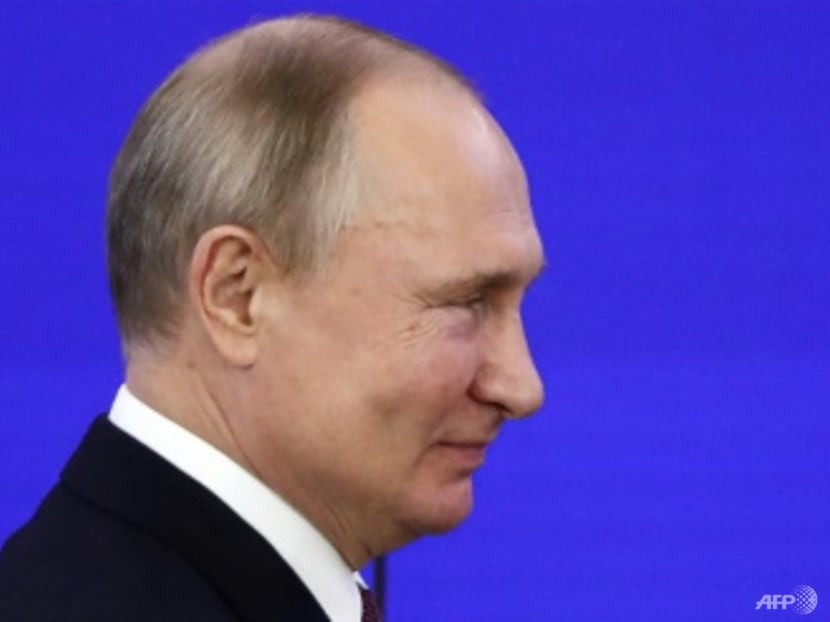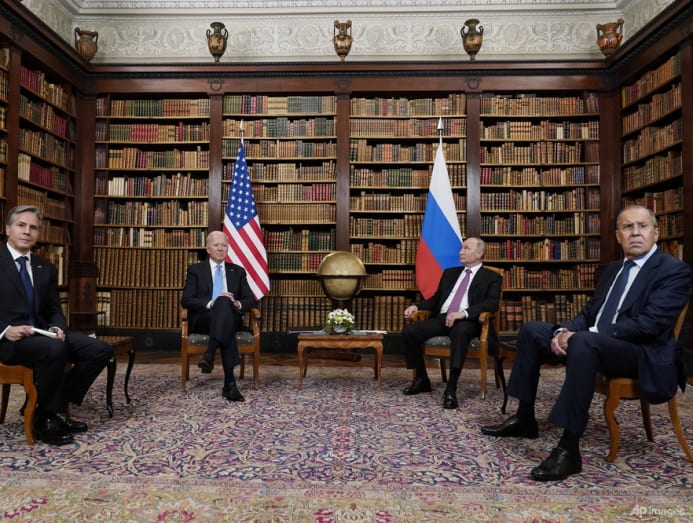Commentary: Is a neutral Ukraine the only way to stop this war?
Ukraine has no good options if Russia refuses to accept anything less than its own peace terms, and there are challenges to making neutrality a viable option to end the war, says international security professor Stefan Wolff.

Ukrainian President Volodymyr Zelenskyy (R in this combination photo) urged direct talks with Russian counterpart Vladimir Putin as the only way to end the war. (Photo: POOL/AFP/File/Evgenia NOVOZHENINA, Sergei CHUZAVKOV)
BIRMINGHAM, England: A month after Russian troops rolled across the border, at last negotiations between Russia and Ukraine are on the table. But on Monday (Mar 21), the Kremlin said that peace talks had not yet made significant progress.
Moscow has pointed the finger at Kyiv for making unacceptable proposals, while Kyiv has said that it will not surrender or accept Russia’s ultimatums. Russia’s foreign minister, Sergei Lavrov, had earlier declared in a news conference that Ukraine’s neutrality status was being seriously discussed, hastening to add that it would be “along, of course, with security guarantees”.
A week earlier, Ukraine President Volodymyr Zelenskyy had already indicated he will not press for North Atlantic Treaty Organization (NATO) membership, given the limited appetite for it within the alliance.
WILL RUSSIA ACCEPT ANYTHING LESS THAN ITS TERMS?
Given that Ukraine’s NATO aspirations and the alliance’s eastward expansion were among the reasons for Russia’s actions in the first place, it’s discouraging that attacks on Ukraine cities have not let up.
Zelenskyy has also said he is open to ”compromise” on Donetsk and Luhansk in eastern Ukraine, which Russia wants recognised as independent states.
But Moscow’s peace terms go further – Russia demands not only Ukraine’s neutrality, but also its demilitarisation. It also wants Ukraine to abstain from taking sides in any disputes or on any issues that touch upon geopolitical rivalries.
This would impose further significant restrictions on Ukrainian sovereignty: Would Ukraine be able to continue pursuing membership into the European Union? Or would it even have to give up its current Association Agreement, a framework for political association and economic integration, with the EU?
Ukraine has no good options if it cannot move Russia towards a compromise. Agreeing to Putin’s terms would be seen internationally as capitulation. After all, the West would be loath to let Putin walk away with everything, especially after the unprecedented sanctions against Russia also resulted in spikes in gas and food prices at home.
Domestically, this might be a bitter pill to swallow for Ukrainians who are counting their losses but also looking to make them count. Zelenskyy’s announcement on Mar 21 that any deal with Russia would be subject to approval by the Ukrainian people in a referendum adds another factor of uncertainty.
But staying the course will come at a heavy cost. The United Nations reported close to 900 civilian deaths in Ukraine since the start of the war and over 3.5 million refugees.
NEUTRALITY SOUNDS GOOD BUT HAS BEEN HISTORICALLY INSUFFICIENT
But how credible is the idea that neutrality would offer the basis for a sustainable end to the war in Ukraine or even guarantee against future conflict with Russia? We need only look at history to see that neutrality provides only limited assurance to Ukraine.
Advocates of a neutrality “solution” often point to the examples of Finland and Austria during the Cold War. Arguably, both countries were neutral and survived periods of high tension between the then superpowers, while developing well economically and becoming consolidated liberal democracies.
Following the so-called Winter War, Finland and the Soviet Union committed themselves to refraining “from any attack upon the other and to make no alliance and to participate in no coalition directed against either of the contracting parties” in the 1940 peace treaty. The subsequent 1947 peace treaty did not require Finland to demilitarise but prohibited it from developing and maintaining anything but small armed forces for “meeting tasks of an internal character and local defence of frontiers”.
Austria is also often hailed as a potential example for resolution, but it came about in the context of Austria regaining its full sovereignty after World War II. The extent and implementation of neutrality were voluntary and decided by Austria, not internationally mandated or guaranteed as part of a treaty. This made it possible for Austria to amend its constitutional law on neutrality in 1995, making it compatible with membership in the EU.
Even if we could imagine such conditions could be accepted by Ukraine, it would still require more than a leap of faith to think that it might put a sustainable end to Russian aggression. Finland’s security guarantees were never really put to the test.
Nor must we forget that Russia had already breached the 1994 Budapest Memorandum when it annexed Crimea and occupied parts of Donbas in 2014.
This was despite the fact that Russia, alongside the UK and the US, had “reaffirmed their commitment to Ukraine … to respect the independence and sovereignty and the existing borders of Ukraine” and “to refrain from the threat or use of force against the territorial integrity or political independence of Ukraine”.

WHAT CAN COME OUT OF PEACE NEGOTIATIONS?
Ukraine faces a two-fold challenge in making neutrality a feasible and viable path toward the end of Russia’s invasion.
First, what kind of neutrality could possibly be negotiated within the three-dimensional bargaining space of a Ukrainian domestic consensus, Russian inflexibility and Western preferences?
Second, what security guarantees could be implemented to assure both Moscow and Kyiv that neutrality is an actual solution? Ukraine must show commitments to neutrality and Russia must be equally credible in its commitments to the sovereignty and territorial integrity of its neighbour.
It is, of course, hard to see what a credible Russian commitment would look like in light of its unrepentant breaches of international law — starting in the aftermath of the war in Georgia in 2008, when Moscow recognised the two breakaway territories of Abkhazia and South Ossetia as independent states.
Ultimately, any and all of these problems will become increasingly difficult to resolve if the brutal war that Russia unleashed against Ukraine continues.
A bitter war of attrition will harden attitudes on both sides and limit the space and appetite for negotiations. What Ukraine and its people need above all right now is a stable ceasefire that puts an end to the humanitarian catastrophe that is unfolding.
Stefan Wolff is a Professor of International Security at the University of Birmingham.









